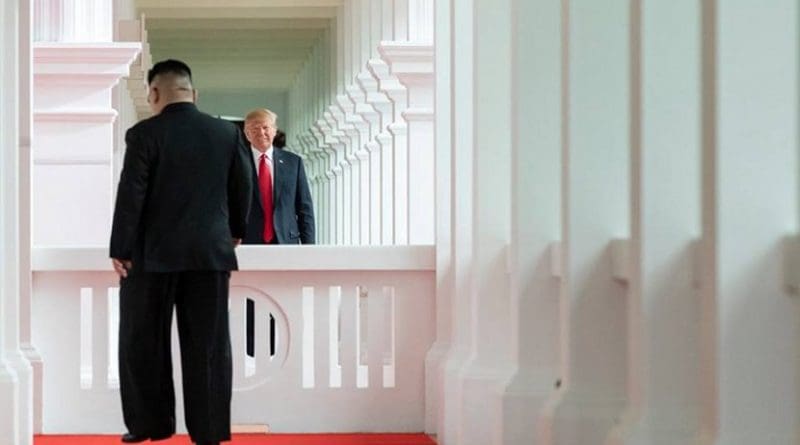How Trump’s Korean ‘Triumph’ Turned To Ashes – OpEd
By Arab News
By Andrew Hammond*
As the second anniversary approaches of his Singapore summit with Kim Jong Un, Donald Trump’s signature foreign policy initiative lies in tatters. Nevertheless, several inter-Korean projects could still move forward.
South Korean President Moon Jae-in, strengthened politically after his ruling Democratic Party’s overwhelming win in April’s parliamentary elections, said only last month that he would intensify the push for improvement of inter-Korean relations. The South Korean government has prepared a draft amendment to the inter-Korean Exchange and Cooperation Act to simplify the process of engaging North Korea, and conducted a survey to register the demilitarized zone, a symbol of confrontation, into a UNESCO World Heritage site.
Moon also regards the coronavirus pandemic as an opportunity for momentum in inter-Korean relations. South Korea has been among the most successful countries in the world at controlling the virus and he has mooted proposals for a “joint quarantine cooperation” with the North to share this expertise. In addition, he wants to advance the proposal he set out in January to implement projects to reconnect Korean roads and railways, and resume cross-border tourism.
Fruitful as this agenda could be, Moon is well aware that it will be tempered by the stalled US-North Korea dialogue. The mood music here has turned almost uniformly negative since Singapore and this seems unlikely to change before the US presidential election in November.
This impasse was entirely predictable, even before the Singapore event. The reason was not just the Trump team’s lack of preparation for the summit, but also the significant expectations gap, and ambiguity, that emerged.
Some even mooted Singapore as a “Nixon goes to China” moment, but this was a highly misleading analogy. Nixon’s visit to see Mao Zedong in Beijing in 1972 followed years of contact building and diplomacy by the president, national security adviser Henry Kissinger, and others. By contrast, Trump’s decision to see Kim was spur-of-the-moment.
These shortcomings were compounded by Trump’s characterisation of what occurred in Singapore. It was no more than a start to a potentially transformational, sustained strategic dialogue, but the president declared that the “nuclear threat from North Korea is over,” giving the impression that he had already completed the immensely complicated process of de-escalating tensions in the world’s last Cold War-era frontier.
Today, as in June 2018, the central challenge is differing US and Korean interpretations of what exactly would constitute “denuclearisation” on the peninsula. To Trump this appears to continue to mean unilateral disarmament. But for Kim it is much more about lengthy negotiations in which Pyongyang is treated as an equal to the US, giving him further propaganda victories. In this context, it is little surprise Kim has remained wary about making concrete commitments on specific time frames, and wants to win further concessions from Trump before any reduction in nuclear capabilities, let alone committing to full denuclearisation in its literal sense.
One reason Pyongyang will not move far or fast in its positioning, at least this side of November, is that Kim, rather than Trump, has emerged as the winner from the process so far. The North Korean leader has made few concrete concessions to the US.
At the same time, Trump has called off military exercises between US and South Korean forces and held out the prospect of an easing of sanctions on Pyongyang; and this when there is evidence that North Korea is continuing uranium enrichment and has stepped up missile production.
This underlines how much Kim has already received from Trump in exchange for the ambiguous pledges to “denuclearise.” On a personal level, for instance, the young head of state has assumed significantly higher political importance on the international stage. The contrast between this feting of Kim, and the situation in 2017 when the Trump team was debating a pre-emptive attack on North Korea, is striking.
Trump remains under political pressure in the US having drawn a red line over Pyongyang having nuclear weapons capable of striking the US. He is well aware that missile tests have shown Kim is close to developing a nuclear warhead capable of being fitted to an intercontinental ballistic missile with this capability.
North Korea therefore represents more risk than opportunity for Trump in 2020. After he hoped it could be the highlight of his foreign policy record, it would be ironic indeed if this issue were in fact to undermine his hopes of re-election.
- Andrew Hammond is an Associate at LSE IDEAS at the London School of Economics


Triumph?When?